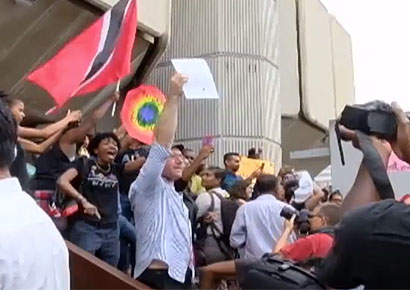LGBTQ Trinidadians under fire after court victory
 LGBTQ people in Trinidad and Tobago are facing a backlash after the country’s High Court ruled last week that criminalising gay people is unconstitutional.
LGBTQ people in Trinidad and Tobago are facing a backlash after the country’s High Court ruled last week that criminalising gay people is unconstitutional.
Local media reported that three young gay men who took part in the post-ruling celebration outside the court, which was shown around the world, have now been targeted and made homeless.
One of the men was thrown out on the streets by his “embarrassed” family, another was accosted when he returned to his rented apartment, and the third was evicted by his landlord. There were also reports that an LGBTQ individual’s car was vandalised after the court ruling.
Colin Robinson, from the Coalition Advocating for Inclusion of Sexual Orientation (CAISO), appealed for politicians and religious leaders to urge their supporters to show acceptance and tolerance.
“That is the most important thing that can happen now. Homophobic violence, the worst kind, psychic violence, happens in the home, in schools and in the workplace,” he told Newsday of Trinidad and Tobago. “It is sad that some of our brave folks who stood up with us have no place to live today.”
Activist Jason Jones also called on the police to ensure that LGBTQ people are safe from violence.
“So, I do implore the acting commissioner of police to instruct his officers to be aware of the issue and the fact that LGBT people are at a higher risk of violence,” said Jones. “I think we all have to be on guard for any unfortunate incidents that may occur. It’s sad but transformation does not happen without this. With growth comes this.”
Thursday’s ruling by the Hight Court found that the sections of the penal code banning homosexuality “are unconstitutional, illegal, null, void, invalid and of no effect”.
Under these provisions, the maximum punishment for “buggery” is 25 years in prison, although this has rarely been enforced in recent years.
The government has said that it will appeal the ruling. The laws remain on the statute books at least until July, when the judge is expected to rule on how they should be repealed.
The anti-gay laws were first introduced in Trinidad and Tobago during colonial times, but they were reworked by parliament in 1986 and the penalties made harsher in 2000.
Leave a Reply